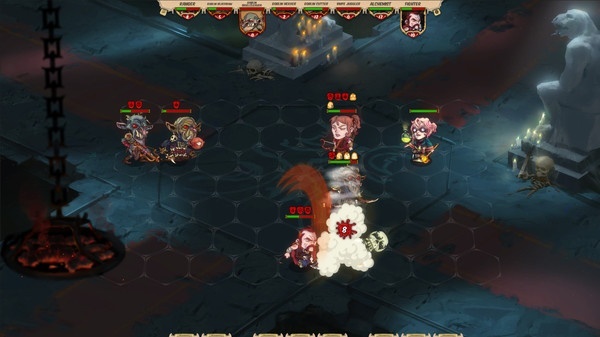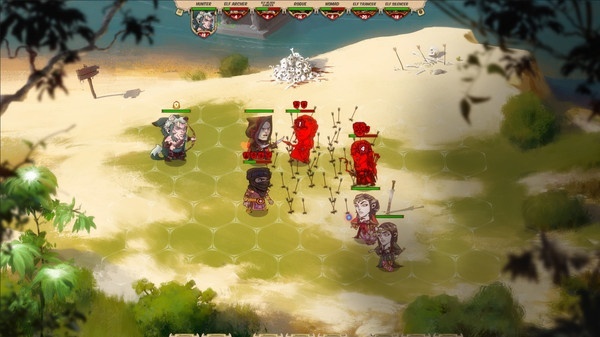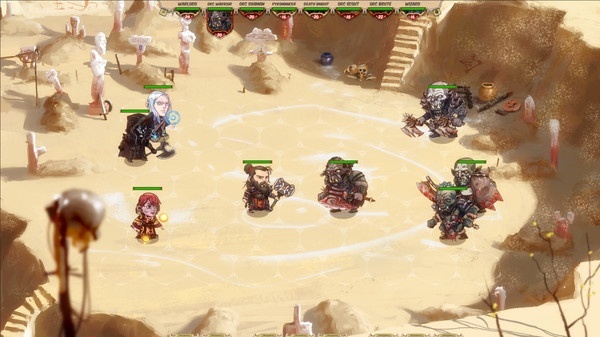Overfall (PC) Review
By Leo Epema  17.05.2016
17.05.2016

Developer Pera Games enters the fray with its first game, Overfall, an open-world entry in the roguelike genre. It's clear it has its own visual style and nice music, but is the rest of the game just as unique? Following a close look at the Early Access version, the most important question now is: does Overfall's level of quality spell success?
Overfall's intro sets the mood and explains the backstory: the humans, under the rule of the Everking, slew the Orcish emperor. With the kingdom stable, he sent envoys into another dimension where they stole the disk of ages, which the Vorn (a race from that dimension) are now trying to retrieve by force. They're going to build a shipyard in the prime universe, in preparation for plundering all its islands.
It can't be said that this story is interesting at all, as it doesn't provide any context as to why the Vorn are going to plunder everything, nor does it give hints or mysteries. These things don't even seem narratively connected - what do Orcs have to do with Vorn? The game itself doesn't answer or reference this sufficiently. In addition to the story being badly explained, it's also badly narrated in the sense that the cadence constantly follows the same rhythm no matter the sentence's contents. It sounds like a bad TV commercial with unenthusiastic actors. In addition, the plot sounds grim to the point of dullness.

While the story is too monotonous, the cartoony quests are refreshing, being humoristic in an often silly way. Sometimes they make fun of popular culture, such as Pokémon's Team Rocket, or classic Warcraft unit sounds. That said, the tonal shift from the quests to the main story is stark, and the characters don't actually notice the Vorn invasion or comment on it. Because of that, it feels as though the main story only serves as a way to introduce a mini-game - the mini-game being outmanoeuvring Vorn ships on the map (which is too easy). Nonetheless, the mini-game does encourage you to visit different island types, a random element befitting a roguelike game.
The various islands contain random side-quests that vary in difficulty and type. One may involve battle, while another might involve the use of diplomacy to stop an evil character from doing something, splitting their loot with you, turning themselves in… anything. The storylines range from teaching a goblin highwayman to be more civil, to a story about betrayal, to simply fighting a group of people with the aid of another group. This amount of variety is lovely to see.
Getting into the nitty-gritty of the gameplay, it becomes clear Overfall provides a fairly deep role-playing experience, as weapons, skills, and healing (food) and upgrading items (frags) can be found for the two starting characters. What's good about it is that such weapons and skills need to be searched for in the world first and unlocked through specific side-quests - they won't just be rewarded or received from random enemies. Because these things force you into specific quests, they can be viewed as challenges the chosen characters need to adapt to. Should a main character die, they can be resurrected at the expense of runes, which are also used to recruit companions. These companions are desperately needed, but should it be desired to make the game much more difficult, you could fight with only your starting characters.

Overfall presents difficult choices, and what happens in the next encounter is random. Something as simple as fighting a few enemies could prove fatal because you didn't have the right characters with which to persuade them to stand down. If one character dies, they can be revived at altars in return for a rune, again sometimes forcing a choice between reviving a main character and recruiting a companion. If both main characters are dead, everything reverts and must be done all over again. This is a bit too tedious considering most fights play out the same, so having to redo a great deal of quests is annoying. Maybe it would've been preferable if the game auto-saved with every major main quest plot point (or perhaps randomly?). Fortunately, unlocks are retained with each Game Over.
The companions are found on random islands, and they have specific classes to supplement your team with. Only two of them can join, forcing thinking about good team composition, which is great. Searching for the companions is another venture in choice-making, as it forces leaving the comfort of inns and bazaars (places for healing and trading). Now, this probably sounds positive, but at the same time, it feels like bazaars and inns are spread out too much over the map. Overall, the companions are nice because there's a great selection of them, and they all bring unique (de)buffing skills. That said, sometimes it is wished that their skills would play into those of the starting characters more. This is because they often have skills that apply a status effect, and a skill that does extra damage if that status effect was applied. It just feels too simplistic since it doesn't take into account the entire team.
Speaking of simplicity, the story encounters are too simplistic, as well. Many quests only offer two dialogue choices, both of which can sometimes advance the quest with exactly the same effects. Fortunately, the companions can affect quests fairly profoundly, which is great. For example, the amazon can provide the option to avoid battling enemies by sneaking past them. In a conversation during the same quest, she produces a map that can progress the quest further. Nonetheless, there's a lack of consequences and immersion, as helping or obstructing bad guys won't result in a new quest or negative consequences to your reputation or the overworld. If a witch was helped out, shouldn't somebody pursue you for it, or perhaps start a battle with somebody to join in with? Instead, the quest dispenses a reward and nothing comes of it. Another welcome addition would've been to allow the companions more diplomatic options, or other dialogue choices. In that case, different companions could give different quest rewards. An element of role-playing, and choice and consequence, is missing.

On a more positive note, the presentation is great. There are many different types of side-quest islands, whether barren or forested, and each battle arena is distinct. They have a watercolour style, which, in combination with their vivid colours, is pleasing. However, they are bland in the sense that they look like typical age of discovery RPG fare, and they don't suit the cartoony, humoristic, and fantastical style the characters adhere to. They're just too realistic-looking for the overall theme. The environments could've also benefitted from adventure aspects, such as hidden items or clues about companions and quest characters. In other words, more adventure for this adventure game would've been perfect to break the monotony of clicking dialogue options. For a title focused on light storytelling, there's not much intrigue or other interesting things. The music is appropriately epic, and suits the (mostly western) view of fantasy.
Finally, the turn-based and tile-based combat is fun. It consists of three phases: movement, utility, and attack, with each move having a cool-down of one turn, meaning it takes some thought not to rush into battle and use a powerful skill too soon. Some characters need to be positioned well to heal others, or damage enemies. The cleric can heal a teammate by pulling them to her on a diagonal, and some casters might have to be within a certain range to pull off specific spells. If one of them should do area damage, it's a good idea to make characters huddle together by baiting them with a group of melee characters.
Healing is silly, though, because enemies put many debuffs on ally characters, and which ones are healed first tends to be random. That restrains freedom a bit much, and forces a more healing-oriented path. Telling which (de)buffs have been applied is also tough to see, because the icons are microscopic and lack visual cues, making it necessary to inspect them, breaking the flow of battle. Lastly, it's a shame it's impossible to tell which enemies have which skills, as that would allow more strategic and efficient planning.

Cubed3 Rating
Very Good - Bronze Award

Overfall is a good game - better than most first attempts at game development. It provides simple laughs, but still decent storytelling. Its strength does not lie in its role-playing aspects, though. It would've been a more tactical game if it allowed for mixing and matching through customisation of characters' skills and passive traits, and unique armour would've done much to alleviate the boredom of looking at generic character models. It does have good replay value with a few unlockable weapons, trinkets, and companions, though. If you want to play a simple blend between role-playing and the randomness of roguelikes, give it a try.

![]() 7/10
7/10
![]() 0
(0 Votes)
0
(0 Votes)
 Out now
Out now  Out now
Out now  None
None  Out now
Out now Comments
Comments are currently disabled

 Sign In
Sign In Game Details
Game Details Subscribe to this topic
Subscribe to this topic Features
Features





 Top
Top

